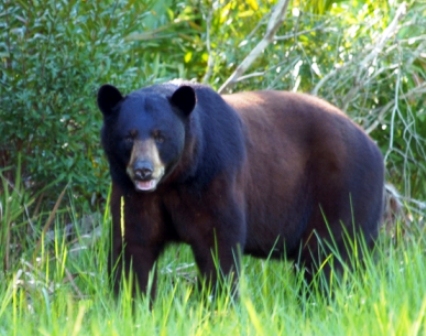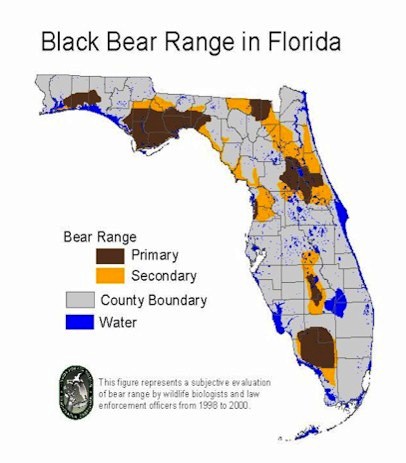Discover Florida Nature
It's time to explore the natural Florida


|
|
|
|
|
 There
have been more and more black bear sightings in Florida. According to
the FWC You are more likely to see a panther or a black bear today in
Florida than someone here 40 years ago! There was a total of 2,257 Florida black bear sighting reports as of June 2014, with more than 500 of those reports containing uploaded photographs. Sightings of bears were reported in 59 of the state’s 67 counties.
To report a
bear
sighting contact the FWC. There
have been more and more black bear sightings in Florida. According to
the FWC You are more likely to see a panther or a black bear today in
Florida than someone here 40 years ago! There was a total of 2,257 Florida black bear sighting reports as of June 2014, with more than 500 of those reports containing uploaded photographs. Sightings of bears were reported in 59 of the state’s 67 counties.
To report a
bear
sighting contact the FWC.The Florida black bear is found in Florida, southern Georgia and southern Alabama. It is a unique subspecies and is considered threatened by the state of Florida. The Florida black bear can be distinguished from other subspecies by genetic and skeletal differences. The Florida Black bear is one of eighteen known subspecies found throughout the United States and Canada The black bear population of the United States is estimated at 750,000, with the largest state number at 7,000 in Pennsylvania. Unfortunately, Florida's population is not so numerous. At one time the Florida bear population once ranged the entire state, Once estimated at 12,000 animals with a range throughout Southern Georgia and Alabama. Today the bears' numbers are estimated at about 1,500. The average black bear male weighs about 350 pounds while a female average weight is 150 pounds. The bears' diet is about 80% vegetation. Foods include berries, acorns, insects and palmetto hearts. The average home range of an adult female black bear is almost 11 square miles' a male's is around 66 square miles. A healthy bear population needs at least 400,000 acres to survive. To protect an area of that size in a highly-developed Florida requires preserving the connections between core habitats. Bears inhabit both wetlands and upland forest habitats. Black bears originated in  Protecting
the habitat of the wide-ranging black bear benefits many other species
that depend on the same habitat type, such as the threatened Florida
scrub jay and the eastern indigo snake. For this reason, bears are often
referred to as an “umbrella species”. The bulk of Florida's bears occur
in six major populations located in the: Protecting
the habitat of the wide-ranging black bear benefits many other species
that depend on the same habitat type, such as the threatened Florida
scrub jay and the eastern indigo snake. For this reason, bears are often
referred to as an “umbrella species”. The bulk of Florida's bears occur
in six major populations located in the:Ocala National Forest/ River Basin Big Cypress National Preserve/Everglades National Park Apalachicola National Forest Osceola National Forest/ Okefenokee National Wildlife Refuge (south Georgia) St. Johns River corridor Eglin Air Force Base Chassahowitzka, Highlands and Glades counties. Nearly 20 acres of wildlife habitat are being lost to development every hour in Florida, one of the most rapidly urbanizing states in the nation. To ensure survival of this subspecies, it is critical that bear habitat, adjacent to and serving to link existing public lands, be purchased as public lands or managed by private landowners in a manner compatible with the long-term survival of the Florida black bear. Approximately 25-50% of all cubs die before they turn one year old. Natural causes of death include drowning, den cave-ins, hypothermia due to flooded dens, starvation, infections from injuries, and predation (by other bears). Road kills are considered the leading known cause of Florida Bear mortality. More than 1,356 bears are documented to have been killed by vehicles since 1976. Well over 100 bears are killed on Florida roads each year, with the record number, 132, occurring in 2002. Once fully grown, black bears have no predators besides humans and other bears. The other causes of mortality are old age, starvation, poaching (Florida has no legal hunting season), other bears, and disease. |
|
|
Advertise | Privacy Statement | Dog Encyclopedia | Video |Contact |
|